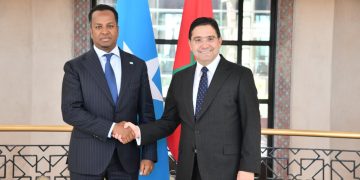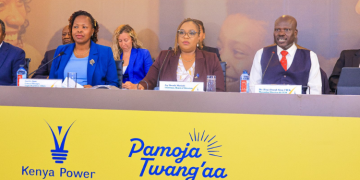The Government of Kenya has signed a deal with Rubis Energies in the rescue plan. With this deal, Rubis will provide Enterprise Resource Planning (ERP) to the National Oil Corporation (NOC) to enhance operational efficiency.
In the Kenya Gazette notice NO. 14058, dated October 25, National Oil Corporation and Rubis Energies have sought the Competition Authority’s exemption for an 8-year non-equity strategic partnership agreement.
“According to the provisions of section 25 of the Competition Act, (Cap. 504), (the Act”), the Competition Authority of Kenya (“the Authority) notifies the public that the National Oil Corporation of Kenya Limited (NOC) and Rubis Energy Kenya PLC (Rubis) has made an application for exemption on certain sections of the Act,” the gazette notice read in part.
The notice further added, “With regards to potential Restrictive Practices for eight (8) years, with respect is a proposed non-equity Strategic Partnership Agreement (between NOC and Rubis.”

Moreover, the overall objective of the non-equity Strategic Partnership agreement is to unlock the financing of NOC’s Downstream Business by Rubis.
Furthermore, the strategic plan is aimed at growing the value of NOC’s Downstream Business as measured by the profitability attributable to Downstream Business. This will be realized through enhanced modernization and expansion of NOC’s retail outlets, growth in sales volumes and increased market share.
National Oil Corporation Strategic Partnership Agreement
The non-equity Strategic Partnership Agreement is in furtherance of the Cabinet Directive of the 8th of August 2023.
The directive approved the revival and commercialization of NOC through the restructuring of NOC and the onboarding of a non-equity strategic partner that would unlock financing and ultimately return NOC to profitability.
Moreover, as a non-equity strategic partner, Rubis will avail financing to NOC for the modernization and expansion of NOC’s downstream infrastructure. In addition, deploy a robust ERP System for effective controls and provide capacity building and management support.
In particular, NOC and Rubis are seeking to be exempted from entering into a non-equity Strategic Partnership Agreement which would involve coordination on several aspects of the services offered concerning the following clauses:
1. Structure of the non-equity Strategic Partnership: Clauses 3.2, 3.2.1 and 3.2.2 of the agreement prohibit NOC from. discussion, acceptance of proposals, offer or accept entering in merger, joint venture discussion, purchases of equity, purchases of assets, issuance of debt, tender offer or otherwise without prior immediate notification to Rubis.
2. Rubis Roles and Responsibilities: Clauses 8.2, 8.9, 8.10 and 8.12 of the agreement provide that Rubis shall deploy the Enterprise Resource Planning (ERP) system, support NOC to manage the downstream business, through the Joint Implementation Committee (BC), approve decisions concerning changes to the strategic directions of NOC’s downstream business and upon approval by JIC, undertake procurement on behalf of NOC concerning all Capex projects.
Also Read: Rubis Dragged to Court, Slapped with Ksh1.6 Billion Demand
Other More Cluses of Exemption
3. Establishment of a Joint Implementation Committee: Clauses 10, 10.1, 1051, 10.6.1 and 10.7 of the agreement provide that the parties shall constitute a joint implementation committee comprising of the Chief Executive Officer of NOC, Group Managing Director of Rubis, select beads of departments and that JIC shall determine staff organizational structure and make key decisions of NOC downstream business.
4. Deployment of the ERP System: Clauses 13.5.3 and 13.6 of the agreement provide that NOC shall use the Rubis procured vendor-certified partner to manage the ERP System and that Ruhis shall have access rights to the system
5. Business Growth, Development and Marketing Support: Clauses 15.1, 15.2, and 15.4.8 of the agreement provide that the parties shall jointly coordinate in undertaking business growth, and Rubis shall provide NOC with technical support in undertaking business growth, development and marketing. Rubis should provide specialized technical training for NOC sales marketing personnel and any other function that NOC requires capacity building.
6. Management Support, Capacity Building and Development: Clauses 16.1. 16.3, 164, 165, 166 and 16.9 of the agreement which provides for management support, capacity building and development including joint training and secondment of staff and outsourcing of operations in certain. aspects of management to Rubis vide a separate management service agreement to be agreed upon, alignment of organizational structure, and staff exchange.
7. Fuel Card: Clauses 17.1, 17.4.2 and 17.4.3 of the agreement provide that in relation to NOC’s Downstream Business, the parties shall deploy common fuel cards, joint marketing of fuel cards and joint reconciliation of transactions.
More Exemptions
8. NOC Brand: Clauses 19.1.2, 19.2.1 and 19.14 of the agreement provide that the parties acknowledge and agree that in providing technical support, Rubis may come into possession of, or support NOC in generating confidential information and NOC Intellectual Property and that Rabis agrees that it shall not disclose or reproduce the Confidential Information of NOC.
9. Information Rights: Clause 23.1 of the agreement provides that NOC shall supply Rubis with the financial information necessary to keep Rubis informed about how effectively NOC’s Downstream Business is performing the shove conduct, if not exempted, will qualify as contraventions under the Act, hence the application for exemption.
Moreover, all interested parties are required to submit any written representations, if any, concerning this application within thirty (30) days of the publication of this notice.
Submissions may be made through the email address [email protected] or the CAK portal https://competition.cak.go.ke 444 under submissions.
Also Read: Global Oil Prices Rise Ahead of EPRA’s Fuel Prices Review
National Oil Corporation Kenya
The National Oil Corporation of Kenya is a fully integrated State Corporation involved in all aspects of the petroleum supply chain.
National Oil was incorporated in April 1981 with a mandate to participate in all aspects of the petroleum industry. The Corporation is wholly owned by the Government of Kenya through joint ownership by the Ministry responsible for the petroleum function.
National Oil became operational in 1984, and its initial operations were limited to exploration activities delegated from the then Ministry of Energy and Petroleum. In 1988, four years later, it went downstream.
The law at present reserves 30 per cent of Kenya’s petroleum imports for NOCK, but it has been unable to explore this opportunity due to its dire financial state.
Follow our WhatsApp Channel and join our WhatsApp Group for real-time news updates.




![14 Companies To Be Granted New Mining Licenses By Govt [Full List] Cs Joho Lists 14 Firms Seeking Mining Licences, Kenyans Given 42 Days To Respond]( https://thekenyatimescdn-ese7d3e7ghdnbfa9.z01.azurefd.net/prodimages/uploads/2025/11/Mining-CS-Hassan-Joho-touring-the-Voi-Gemstone-in-Taita-Taveta-County-on-Friday-August-16-2024.-PHOTOJoho-360x180.png)






































































![14 Companies To Be Granted New Mining Licenses By Govt [Full List] Cs Joho Lists 14 Firms Seeking Mining Licences, Kenyans Given 42 Days To Respond]( https://thekenyatimescdn-ese7d3e7ghdnbfa9.z01.azurefd.net/prodimages/uploads/2025/11/Mining-CS-Hassan-Joho-touring-the-Voi-Gemstone-in-Taita-Taveta-County-on-Friday-August-16-2024.-PHOTOJoho-120x86.png)